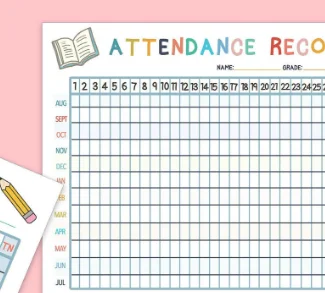It’s no secret that colleges look at attendance. This can be a good thing; however, in some cases, students are not being rewarded for their work in the classroom.
However, what happens behind the scenes of attendance records?
Do Colleges Look at Attendance?
Colleges look at attendance as determining your commitment to your studies. You are not getting your full education if you don’t attend classes.

There are many reasons why you might miss class. You might be sick or have an emergency at home. You might have an appointment that is more important than attending class.
Or maybe you just don’t want to attend class because it isn’t interesting enough.
Some people don’t like school or just don’t enjoy being there — but they still want to graduate with a degree from a good college and get a good job afterward.
If you miss too many classes, colleges will start wondering if you’re motivated to get an education, if you mare just in it for the money, or because it is what everyone else does.
How Does College Attendance Matter in?
1. High School
You see, the credits you earn from high school directly impact your college experience. If you miss out on those credits or don’t complete them in time, it can affect how well you do in college.
It’s not just about getting a good education, either. It’s also about graduating with the right credits and getting into the right classes.
For example, if you want to be an engineer or work in a field related to engineering, you must graduate with appropriate math and science courses to focus on what will help you succeed in your career goal.
2. Colleges
College attendance is the first step toward attaining a college degree. Students who complete a four-year degree program are more likely to find employment, earn higher wages and advance in their careers.

Again, college attendance is the first step toward attaining a college degree. Students who complete a four-year degree program are more likely to find employment, earn higher wages and advance in their careers than those who do not complete any credits during high school.
Still, college attendance matters because it is the first step toward attaining a college degree.
Students who complete a four-year degree program are more likely to find employment, earn higher wages and advance in their careers than those who do not complete any credits during high school.
3. Universities
College attendance matters in the University for various reasons:
First, College attendance is the path to a degree. A college education provides you with the intellectual tools and social connections that will enable you to get ahead in the world. College attendance sets you on the right path to getting a job and making more money than if you had not gone to college.
Second, college attendance can change your life. If you do not attend college, there are many ways that you can still have a great life.
You can save money by working at a part-time job while attending school full-time or by going to school part-time while holding a full-time job. You can also use your time off from work to travel or volunteer with an organization that works in your community or worldwide.
College attendance is a major factor in students’ success. It is an important part of getting a degree, but it is also the first step toward making a successful transition to adult life. College students who don’t attend college are less likely to graduate and more likely to have lower earnings than their peers who go on to earn a bachelor’s degree.
College attendance has several benefits for both the student and society. Students who attend college are more likely to get good jobs and higher wages than those who don’t attend college.
By attending college, students learn new skills and develop their math, science, and reading abilities, which can lead them into positions where they can use these skills in their careers.
Instances when Attendance Does not Matter

Attendance is not the only factor in determining student performance. It is not even the most important. Here are four ways attendance doesn’t matter:
1. You can work hard on the right stuff and still flunk a course because you were absent some days.
2. Chronically absent Students are more likely to drop out of school and fail to complete their education. This is one reason why many universities now have what they call “credit recovery” programs.
3. Chronically absent Students also tend to perform worse in class than students who attend regularly, so even if they manage to pass the course, they are unlikely to get very far in life because their grades won’t be high enough for them to be competitive for jobs or college scholarships that require good academic records.
4. If you are absent from school, it is harder for your teachers and other adults in your life—your parents, teachers, coaches—to recognize your strengths and help you develop them further than if you just show up every day with your classmates who are also working hard at schoolwork.
How Much Does Attendance Count for in College?
Attendance is key to attaining a high GPA and passing all your classes with good grades.
Not attending class can have a negative impact on your GPA and future career options, as well as lower chances of getting accepted into graduate school or other post-secondary programs.
Excused Absences
What has Excused Absence?
An excused absence is a form of leave taken by an employee to attend to personal matters. It can be taken in one of two ways, either as a full day’s absence or as part of a reduced working week.

If an employee has an illness or injury, they will normally receive full payment for all the time they cannot work. However, if they need to take short periods off for medical reasons, their employer must authorize this.
Do Colleges look at Excused Absences?
It depends. There are some situations where colleges will look at excused absences differently. Colleges have policies that address attendance in their institutions.
Still, they don’t care much about them unless it’s something obvious, like being gone for religious reasons or being in jail.
Frequently Asked Questions
Can You Fail a Class for Attendance?
Classes are graded on a curve, so the amount of credit you receive depends on how well you do in the class. If you miss a whole week of class, your grade will be based on your missed work from the first day.
If you miss only one day of class, your grade will be based on your missed work from the second day.
Does Attendance Affect College Acceptance?
Yes, attendance is important to college acceptance. Attending college can be a stressful experience for students who are unsure how they will perform academically and financially.
The pressure of applying to colleges in the first place can be overwhelming, but it’s even more so to know that you must attend school and get good grades to be accepted.
Is Attendance Part of Your Grade?
Missing too many classes can lead to failure in school, which means you won’t get the grades that would help you get into college or university.
Attendance is a part of your grade. If you miss class, it will affect your overall grade. If you miss too many classes, it becomes a serious problem for you and your teacher. The school system knows this and will treat you accordingly if you fail to meet their attendance requirements.

